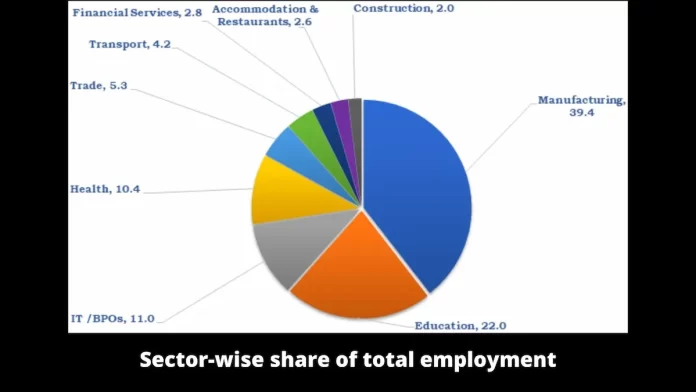Ministry of Labour and Employment (MOLE) released today the Report of the third quarter of the Quarterly Employment Survey (QES) for the period October-December, 2021, prepared by the Labour Bureau, an attached office of MOLE.
The report indicates an increasing trend in employment in the organized segment employing 10 or more workers, of the selected nine sectors viz. Manufacturing, Construction, Trade, Transport, Education, Health, Accommodation & Restaurants, IT, BPOs, and Financial Services.
Quarterly Employment Survey (QES) is a part of the All India Quarterly Establishment-based Employment Survey (AQEES).
The AQEES has been taken up by the Labour Bureau to provide frequent (quarterly) updates about the employment and related variables of establishments in both organized and unorganized segments of nine selected sectors, which account for a majority of the total employment in the non-farm establishments.
QES captures employment data in respect of establishments employing 10 or more workers, mostly constituting the organized segment, in the nine selected sectors.
These sectors are Manufacturing, Construction, Trade, Transport, Education, Health, Accommodation & Restaurants, IT, BPOs, and Financial Services.
- These nine sectors accounted for about 85% of the total employment in units with 10 or more workers in the 6th Economic Census.
- The Report indicates an increasing trend in employment in the organized segment, employing 10 or more workers, of the selected nine sectors.
- ‘Manufacturing’ sector is the largest employer accounting for around 39% of the estimated total number of workers followed by the Education Sector at 22%.
- Almost all (99.4%) establishments were registered under different statutes.
- Overall around 23.55% of units provided on-the-job training to their workers.
- Among 9 sectors, 34.87% of units in the health sector provided on-the-job training, followed by IT/BPOs at 31.1%.
- About 1.85 lakhs vacancies were reported across the 9 sectors.
- 85.3% of the workers were Regular workers and 8.9% were contract workers.
